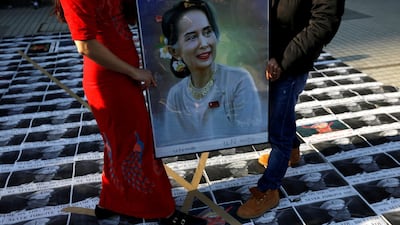US President Joe Biden led international calls to reverse a military coup in Myanmar on Monday which saw democratically elected leader Aung San Suu Kyi detained and a one-year state of emergency imposed.
Ms Suu Kyi and President Win Myint were detained in the capital Naypyidaw before dawn. The ruling junta removed 24 ministers and deputies and named 11 replacements on the same day.
In the wake of the coup, the military moved quickly to stifle dissent, severely restricting the internet and mobile phone communications across the country.
"The international community should come together in one voice to press the Burmese military to immediately relinquish the power they have seized, release the activists and officials they have detained, lift all telecommunications restrictions, and refrain from violence against civilians," Mr Biden said in a statement.
He threatened to reinstate sanctions lifted over the past decade as Myanmar made progress towards democracy.
"The reversal of that progress will necessitate an immediate review of our sanction laws and authorities, followed by appropriate action," he added.
US Senate minority leader Mitch McConnell called the coup “horrifying” and urged action.
The UN Security Council said it would discuss developments on Tuesday, and European Council President Charles Michel called for the democratic process to be restored.
British Prime Minister Boris Johnson said on Monday he condemned the coup, saying Aung San Suu Kyi and other civilian leaders must be freed.
"The vote of the people must be respected and civilian leaders released," he said.
Britain's foreign ministry said it had summoned Myanmar's ambassador and told him that "the UK would work with like-minded partners and pursue all necessary diplomatic levers to ensure a peaceful return to democracy."
The 75 year old Ms Suu Kyi won the Nobel Peace Prize in 1991 while under house arrest during the previous dictatorship. She was released in 2010 and went on to established the first civilian government in 50 years in 2015.
Her ousters claimed the November election was a “terrible fraud” despite international poll watchers backing the landslide victory of Ms Suu Kyi’s National League for Democracy.
They were only the second democratic election to occur since Myanmar wrestled free of a 49-year dictatorship in 2011.
Monday’s putsch was widely seen as an attempt to consolidate power in the hands of the country’s powerful military, which constitutionally holds 25 per cent of the seats in parliament.
The 2008 constitution barred Ms Suu Kyi from becoming president and ensures military control of key ministerial portfolios like defence and the interior.
Ms Suu Kyi is a popular figure in Myanmar, despite drawing international condemnation for defending a military crackdown on the country’s minority Rohingya people.
The attacks in 2017, deemed a genocide by UN investigators, killed 6,500 people in one month and forced 750,000 to flee into neighbouring Bangladesh.
The news of Suu Kyi's arrest spread quickly in the crowded refugee camps in Bangladesh, with reports of celebrations.
"She is the reason behind all of our suffering. Why shouldn't we celebrate?", community leader Farid Ullah told AFP from Kutupalong, the world's largest refugee settlement.
Maung Kyaw Min, the spokesman for the influential Rohingya Student Union, said there was now increased hope that Rohingya might return to their villages in Myanmar.
"Unlike an elected government, this military (government) will need international support to sustain. So we hope they will focus on the Rohingya issue to reduce international pressure," he said.


